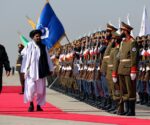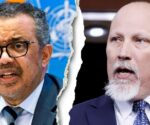The world’s ‘next war’ that nobody is talking about | World | News
Tensions between Venezuela and its neighbour Guyana are reaching boiling point, as fears grow of an imminent outbreak of war between the two South American nations.
Last December, the Venezuelan government held a referendum on whether to annex two-thirds of oil rich Guyanese territory, known as Essequibo.
According to Venezuelan officials, more than ten-and-a-half million voters or more than one third of the country’ population, took part in the plebiscite.
They claimed as many as 95 percent had voted in favour of annexation, although many independent observers dispute this figure.
Venezuela’s President Nicolas Maduro declared the people had spoken loud and clear.
He added that the government had no choice but to respect the almost unanimous will of the people.
Venezuela proceeded to move troops towards the border, while the country’s Defence Minister stated that the territorial dispute between the two countries was “not a war for now”.
An uneasy truce was brokered between the two sides at a meeting of the countries’ presidents on the eastern Caribbean island of St Vincent later in December.
President Mauro and his Guyanese counterpart Irfaan Ali signed an agreement ruling out the use of force to settle the dispute.
However, the agreement looks all but null and void, after President Maduro deployed military troops, light tanks, missile-equipped patrol boats, and armoured carriers to the border with Guayana in February.
The move is a clear escalation of existing tensions, which threaten to boil over into direct conflict.
In response to the military threats it is facing form its larger neighbour, Guayana has just purchased a $42-million military patrol vessel from French shipbuilder Ocea.
The move brought a swift rebuke from Venezuela’s Vice-President Delcy Rodriguez.
In a post on X, she wrote: “The fake victim Guyana buys an ocean patrol vessel from a French company.”
“Guyana, together with the United States, its Western partners and its former colonial master (Britain), constitute a threat to peace in our region. Venezuela will remain vigilant.”
Essequibo is rich in natural mineral resources such as oil, gold, and diamonds.
Exxon Mobil began production operations in the region in 2019 and produces 400,000 barrels of oil and gas daily.
The bitter territorial dispute is long standing. Venezuela insists the Essequibo region was part of its territory during the Spanish colonial period, and argues the 1966 Geneva Agreement between their country, Britain and Guyana, the former colony of British Guiana, nullified the border drawn in 1899 by international arbitrators.









